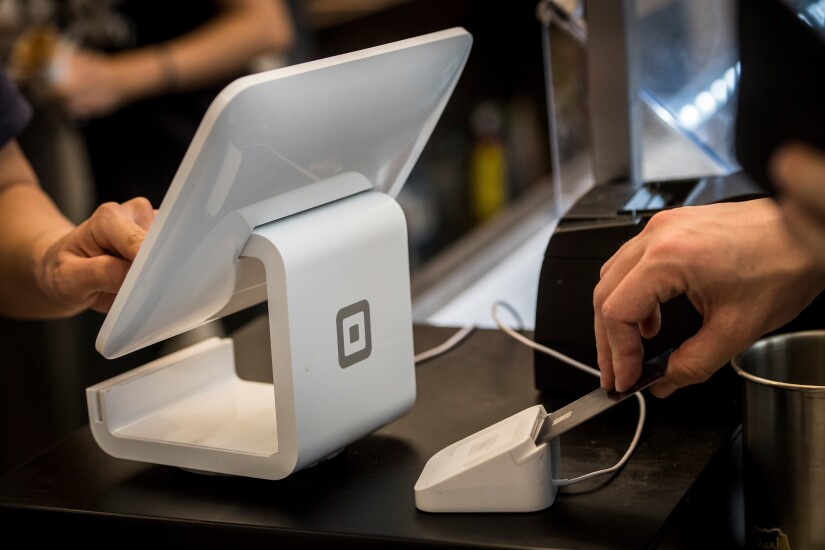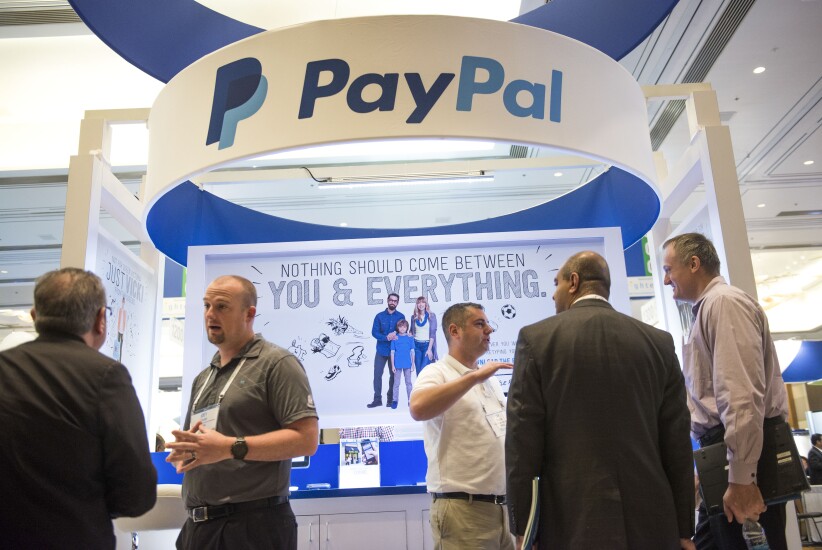Revolut is adding cryptocurrency payments as it competes with crypto-friendly fintechs like Block and PayPal. Block introduces new restaurant technology in Australia, and U.K. banks suffer payment outages as the country plans stricter regulations to ensure payment service. Here's what's happening in the world of payments.

Google, Mastercard and Visa expand payment reach in India
Users will be able to add family members and close friends as "delegates," who will be able to make payments without having to add their own bank account information. Users can approve payments on a transactional basis or set a monthly limit.
Google Pay will also add integrations for UPI vouchers, which allow consumers that aren't on the UPI network to pay with a prepaid voucher connected to their mobile number, bill payments using ClickPay QR code scanning and prepaid utility payments, among others. Google is one of the largest
Visa also announced a suite of new products on the last day of Global Fintech Fest aimed at driving digital payment adoption in India.
The payment-processing company said it is working with HDFC Bank to create a compact payment device for merchants that integrates point-of-sale, QR code scanning, and soundbox, which provides audio alerts when a digital payment is received and confirms the amount of the payment. Visa is also working with payments India-based Paytm and Asia-based Pine Labs on two separate soundbox devices that integrate QR codes.
Other initiatives include: Neo for Merchants by Axis Bank and Visa, a mobile payments application for payment acceptance, transaction reporting and service requests; PayU Push Provisioning, which allows for the sharing of card tokens; and new credit and debit card offerings with HSBC and IDFC First Bank, respectively.
Meanwhile,
Mastercard plans to roll out the program to additional financial institutions in the coming months, according to a company release. —Joey Pizzolato

Class action suit over payment fees can proceed in the U.K.
The U.K.'s
The trade groups and other merchants are arguing the multilateral interchange fees are too high, resulting in damages of about $5.2 billion,
In the past, British merchants such as Tesco and Sainsbury's have won
"We disagree with the basis of this claim. Businesses get real value when they choose to accept cards issued on our network, helping them grow their sales, ensure a guaranteed payment, reach new customers and reduce fraud," Mastercard's public relations office said in an email.
Visa did not return a request for comment by deadline.
The card networks also face legal pressure in the U.S., where interchange lawsuits can be traced back
Under the scuttled U.S. settlement, the card networks agreed to lower interchange fees, though trade groups such as the National Grocers Association and Merchant Payments Coalition said the settlement would only provide temporary relief. —John Adams

Payment outages hit the U.K., bolstering the central bank case for better resilience
Thousands of consumers filed complaints with tracking website
The glitches followed an outage at the
The BofE is mandating improvements in the
"Confidence in financial markets infrastructure services (FMI) is critical to having a vibrant and prosperous economy," said Sasha Mills, executive director of the Bank of England,

Revolut pushes crypto for everyday purchases
The fintech's digitally issued cards are integrated with Apple Pay and Google Pay and convert the cryptocurrency to traditional money at the point of sale.
But by adding technology to support payments, Revolut can compete with other payment-focused technology companies like PayPal and Block, which are investing in their cryptocurrency strategies.

Block adds payments tech in Australia
Square Kiosk integrates with other Square checkout products and merchant services. Square Kiosk tracks sales and syncs menu updates. The consumer user interface enables ordering, customization and upgrades, with the order going directly to the kitchen.
Payment can be made via Square as part of the ordering experience. Block, which retains its original Square brand for merchant products, linked the new product to staffing shortages in Australia, particularly in the service sector.
"It's a challenging time to be in Australian hospitality right now, but speaking to people in the industry, we see how resourceful they are and how they're looking for ways to operate more efficiently, without impacting service quality," said Jean Magalhães, Hospo Product Lead for Square in Australia, in a release.
Block is in the midst of a

Stripe rolls out AI for cross-border payments in Asia
The San Francisco-based company is using AI to determine which payment method to show customers as well as localizing prices and allowing payments with local currency across 150 markets – including Australia, Hong Kong, India, Japan, Malaysia, New Zealand, Singapore and Thailand. Stripe is also using natural language processing
U.S.-based merchants can also now accept payments from South Korea via Stripe.
The new features come after a 30% increase in cross-border payment volume in the region last year, according to Stripe. The company said that 90% of customers choose to checkout in their local currency and that businesses can expect a 18% increase in cross-border revenue and an 8% uptick in conversions. —Joey Pizzolato

PayPal leads investment round in Brazilian payments fintech
The San Jose, Calif.-based payments giant injected fresh capital into Ume, a buy now/pay later fintech,
São Paulo, Brazil-based Ume, founded in 2011, works with small and medium-sized merchants to allow customers to break up payments for goods into four installments. It will use the funds to expand into the southeast region of the country, according to Brazil Journal.
The company has raised $35 million across three funding rounds, according to Crunchbase.
The investment comes as more payments companies flock to Brazil. Payments and financial platform

NCR Atleos to let consumers trade Bitcoin for cash
The offering leverages LibertyX, a cryptocurrency software company designed for ATMs that NCR acquired in 2022, according to the company. LibertyX users will be able to cash out Bitcoin at thousands of merchants across the country by selling their cryptocurrency in the LibertyX app before withdrawing their funds from the ATM.
The value-added service hits the market at a time when ATMs

Euronet unit expands U.S. remittance network
PLS has more than 3 million consumers in the U.S., mostly immigrants who have relatives in other countries, and an international network of more than 600,000 cash pickup locations.
The U.S. is the

TerraPay hires another Visa executive
Koker's role will be to refine the company's product strategy and spearhead comprehensive go-to-market initiatives. Before joining TerraPay, he was a member of Visa's global money movement team.
Earlier this year,





